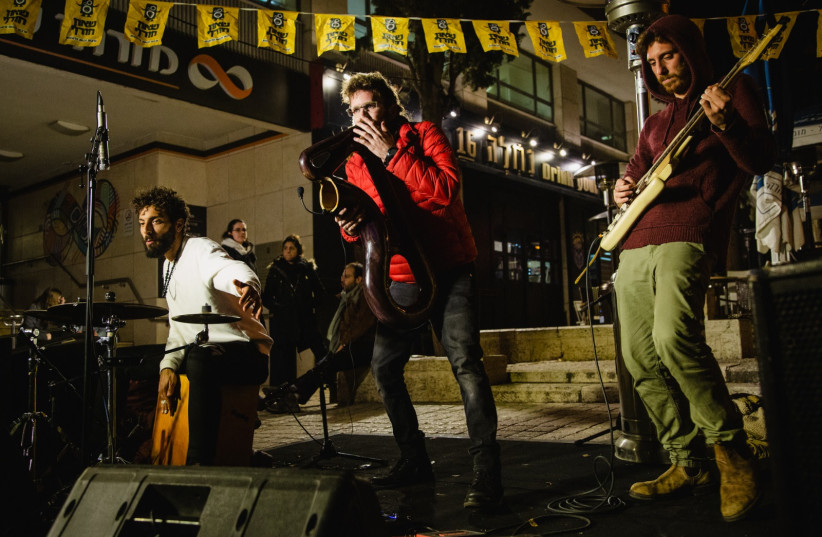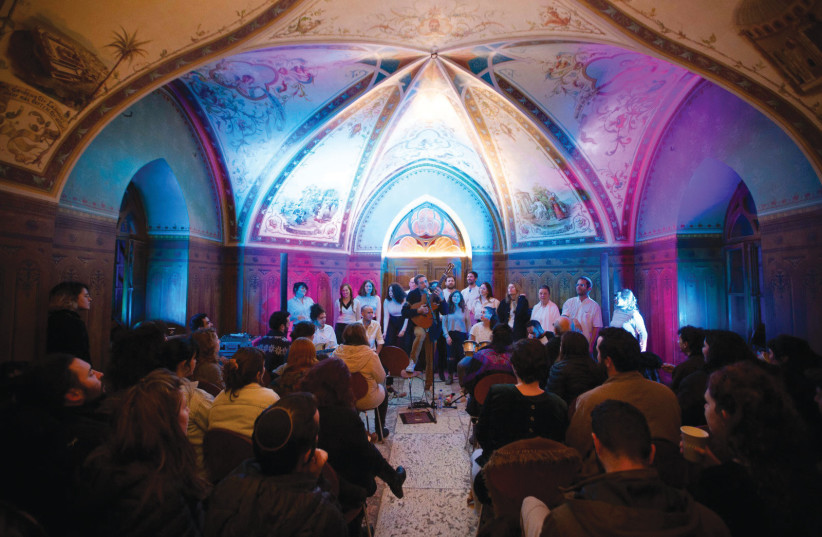It’s that time of the year. It’s the time of year when, intermittent sunshiny days notwithstanding, some of us might be getting a little weary of the cold Jerusalem air and longing for some cheerier ambiance.
Well, it’s also Sheon Horef time. The festival moniker translates as something like Winter Sound, and the program is set to leave the traps for the 12th year, with the next four Mondays awash with slots of a cultural, decisively entertaining, fun and informative nature.
As usual, each week’s events take place in a different sector of downtown Jerusalem, kicking off with the environs of Shushan Street, followed by the area in and around the confluence of Bezalel Street and the Shatz Street pedestrian thoroughfare, and then Hillel Street, before closing out on vehicle-restricted Shimon ben Shetah Street.
Mayor Moshe Lion calls Sheon Horef, which takes place under the aegis of the municipality’s Youth Authority, “Israel’s biggest winter festival.” Indeed, he has some collateral for the claim, particularly in these still pandemic-shocked days. “We have created, for the visitors, an abundance of exceptional and inspiring events,” he declares.
SO, WHAT outstanding and stirring offerings can we hope to encounter over the next month?

Rap fans looking to get a deeper handle on the genre, will get an early fillip when Ravid Plotnik takes the stage at Post Hostel on Koresh Street in the opening berth, at 8 p.m. on Monday. And this won’t be just any old gig. For the occasion Plotnik meets up with radio music show presenter and critic Saar Gamzu for a session of “guided listening” and a chat about Plotnik’s latest release, Toch Kedei Tenua (On the Fly).
The Sheon Horef organizers are certainly not holding back. All told the four-weeker takes in 120 events, including a broad sweep of musical styles, lectures, guided walks and a whole host of entertaining whatnots designed to warm the proverbial cockles, keep the blood rushing and our body temperature right up there.
One festival venue that is eminently designed to offer the public plenty in the way of thrills is the Mazkeka basement music joint and bar over on Shushan Street. Since its opening, back in summer 2014, the club has cultivated a loyal and expanding fan base, offering a wide range of musical fare, from indie pop to jazz, avant-garde and electronica, with some ethnic spicing mixed into the heady Mazkeka brew.
MONDAY’S 8 P.M. festival opener should do the business when it comes to getting the punters grooving. First up is the Satellite sextet, which describes its output as “anything from Anatolian rock to vintage psych and spacey grooves.”
The latter intimates the general ambiance of the group and its music, with a little Turkish seasoning worked in. “The band name came up in rehearsals,” explains band leader and baglama – also known as saz – player Itamar Kluger somewhat cryptically. “Satellite sort of alludes to outer space and that kind of thing. And the S has an accent underneath it, which turns it into a sh sound,” he adds with a laugh.
Satellite is more than the sum of its parts which, when you think about it, makes perfect sense. After all, Turkey, and specifically Istanbul, is at the physical and cultural interface of West and East, and Turkish music is a kaleidoscope of colors, idioms, nuances and genres from all over the show.
That multifaceted aspect certainly appealed to Kluger as he made his way across Turkey around 12 years ago, when he was on an extended post-army service odyssey around the world. “In my teen years I listened mostly to heavy metal and punk rock, and ’90s stuff by bands like Nirvana, Pearl Jam and [British electronica band] The Prodigy.”
For many, the grunge rock vibes of the 1990s were a natural successor to the ’70s rock scene, leapfrogging the very different New Wave and synthesizer-oriented fare of the intervening decade. It took the now 37-year-old Kluger a while to latch onto the earlier rock sensibilities.
“I was exposed to the whole seventies scene only at a later stage,” he notes. “That was after Turkey. I heard Led Zeppelin only about three years ago, after I began looking for all the influences on Turkish music. I appreciated the qualities of ’70s rock only later on. As a kid all I wanted to do was be angry and kick out.” Sounds like par for the teenage rebellion course.
Clearly we are not talking about the pure classical side of Turkish music here, even though Kluger and Satellite play almost exclusively acoustic instruments. You won’t, for example, find him letting rip with some frenetic arpeggios on electric guitar, à la Jimmy Page.

KLUGER’S GAME changer occurred in the rural far reaches of Turkey.
“I was in the mountain area in the east of the country when I heard someone in a village playing a baglama,” he recalls. The thunderbolt had well and truly struck home. “My soul flew. I couldn’t believe I had never heard anything like that before. I just knew I was going to go back home with a baglama.”
The instrument was duly procured from a store in Istanbul, even though Kluger says he was ripped off.
“I paid far too much for a poor-quality instrument,” he chuckles. “They saw me coming.”
Kluger may have been charmed by the sultry sounds of the baglama, but it wasn’t exactly a “and the rest is history” juncture. It took a while, quite a while, for him to begin achieving any degree of instrumental mastery. “I’d played around on a guitar before, but that was just for fun. And I tried playing the baglama, but it didn’t work. For some reason I just couldn’t get it.” The long-necked stringed instrument was consigned to the proverbial boidem cubbyhole.
However, he did get an earful of the core sounds. “I started listening to Turkish music, loads of it. Over the next four years I really got into listening to Turkish music and Arabic music. My ear really became attuned to all of that.”
Serendipity then showed its sunny face once again. “A friend came round and he said: ‘You listen to all this music. Why you don’t try playing some? I remember you have an instrument somewhere.’ I said, ‘You’re right,’ and I went to the boidem and got it out.” That was the momentous turning point in Kluger’s life path.
Contrary and, in fact, subsequent to his initial attempts at finding his way around the baglama, he had more than sheer enthusiasm in his tank. By now Kluger was fully primed and ready to go.
“I tuned the instrument to the Internet and I dived into it,” he explains. “I’d heard so much of the music before that. I think everything begins with listening. You have to listen a lot. It’s like that with [spoken or artistic] language. You have to listen to it a lot.”
HE FOUND all the guidance he needed online and just went for it. “I watched loads of people playing music on YouTube. I learned to play the oud a bit, too. I just watched them playing and tried to copy them. The world of YouTube is so vast.”
Still, it wasn’t all about following a virtual rainbow until he found his pot of musical gold. He got himself some definitively street-level education by working at Yakov Lev-Sameach’s fabled ethnic musical instrument store on Tel Aviv’s Allenby Street for two years. There he caught some of the cream of the crop doing their polished thing.
“I learned the craft there, and people like [Iranian-born multi-instrumentalist] Amir Shahasar and [ethnically leaning rocker] Mosh Ben-Ari would come in and try the instruments out. It was fantastic watching them play. It wasn’t that someone sat down to teach me things. It was just so important to absorb the spirit. That was an important part of my education.”
It was time to hit the road, and Kluger paired up with a percussionist cousin, and they did the rounds of weddings and various venues up and down the country. It was a living of sorts, but Kluger was not making too much creative progress.
Lady Luck eventually showed her hand again when the pair were due to play at the BuXa club in Tel Aviv.
“The soundman was Ariel [Harrosh] who is now the bassist in Satellite,” Kluger recalls. “It was just by chance that he was there. He was just filling in for the regular soundman. After the show he told me he was in a band and they were looking for a saz player.”
Kluger was game, and he went along for a jam session. Harrosh and his pals were in for a surprise when he told Kluger they wanted to sound like Amsterdam-based Turkish psychedelic funk rock outfit Altin Gun. “I remarked to Ariel that Altin Gun only play covers. They didn’t believe me. They didn’t know who they were dealing with. I knew all the source material Altin Gun plays.”
THAT, IN essence, was the birth of Satellite. “I led the band from the start because I knew all the music, better than them. I educated them, with my knowledge of Turkish music.”
And this was never going to be a straight-ahead Turkish venture. “As soon as you have drum and bass, it is not going to be classical Turkish music. It is going to be groove, actually rock.”
A couple of months later vocalist Yuli Shafrir came along, liked what she heard and joined the band, with Lotan Yaish on drums. The group now also includes Tsuf Mishali on synthesizer and keyboards, and Tal Eyal on percussion.
The Mazkeka gig will feature much of the material that will appear on the band’s self-titled debut release, which is due out, on vinyl, on April 1. It is a well-grounded project.
“We had a regular gig at a Turkish restaurant in the flea market in Jaffa,” Kluger explains. “We played there for about a year-18 months. We saved up the money we made from that to finance the recording of the album. We worked hard for that.”
The pandemic put the group on hold for a while, and Kluger carried on with the mix and mastering phases, largely paid for out of his own pocket.
Monday’s show should be a blast for all concerned. “We don’t try to be Turkish,” says Kluger. “We approach the music with great respect. We just love it.” ■
For tickets and more information about the Sheon Horef Festival: shaon-horef.co.il/ and www.facebook.com/ShaonHoref
